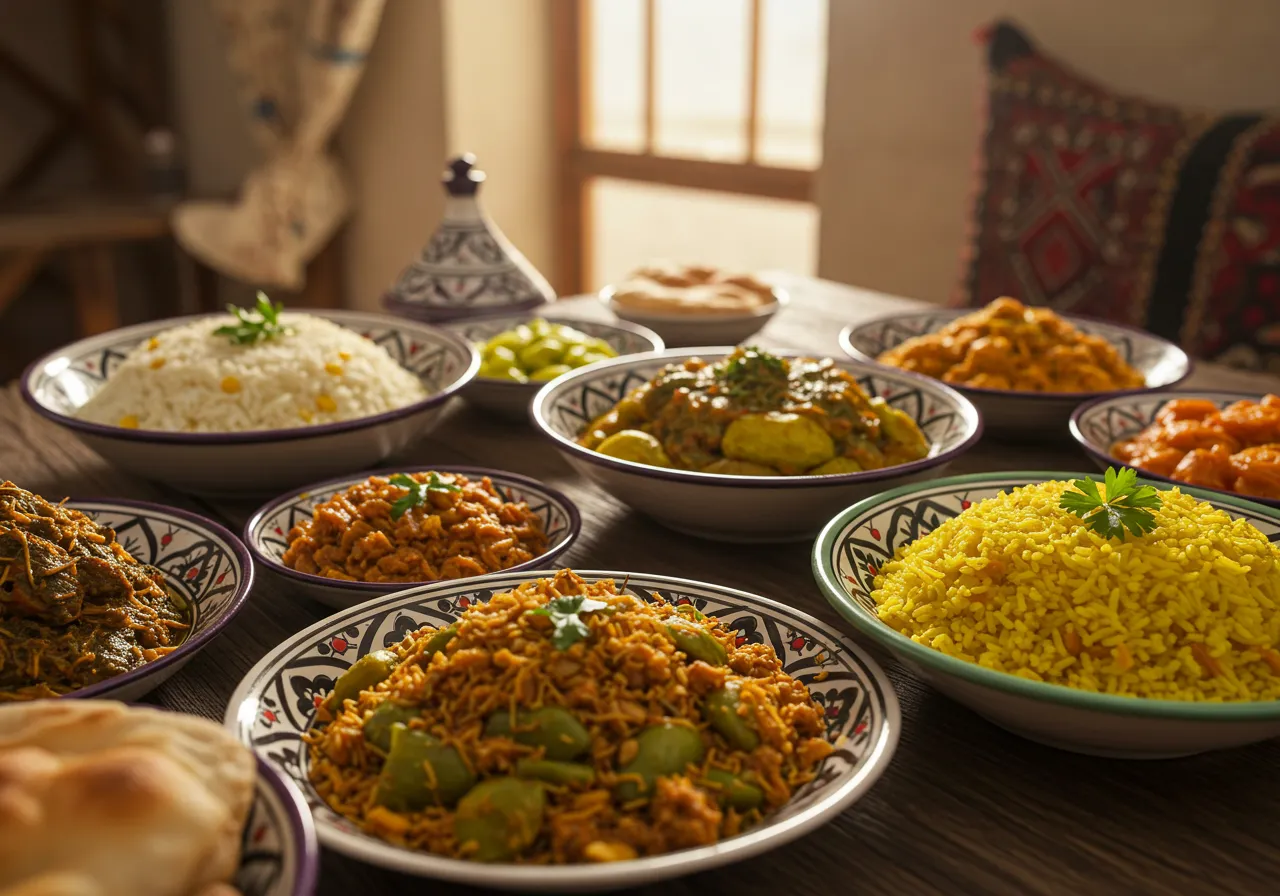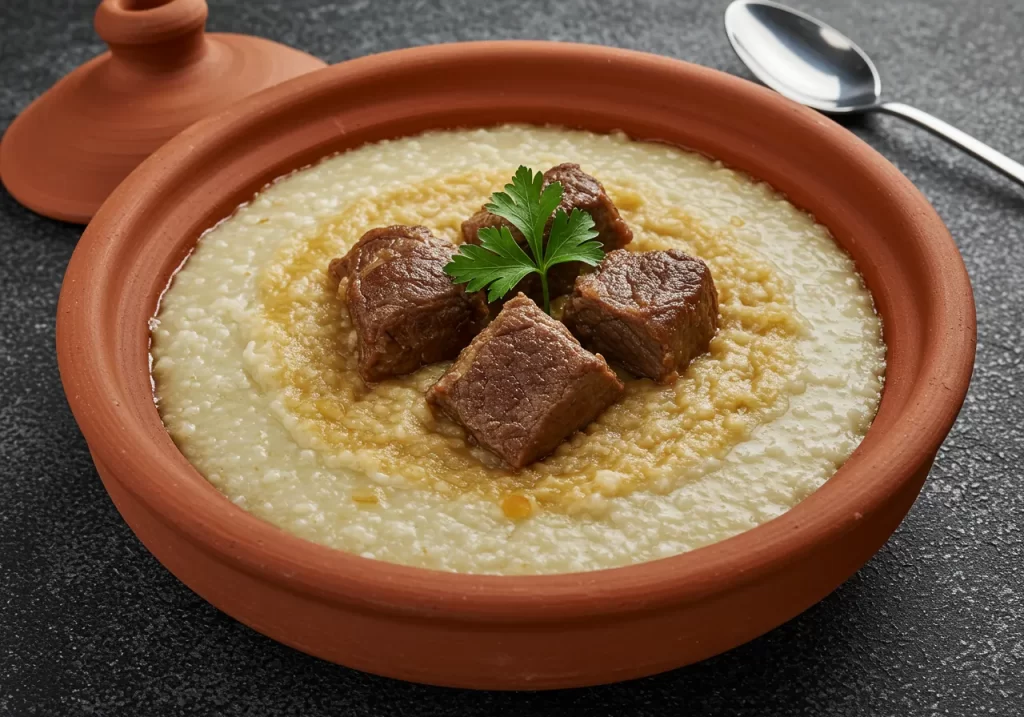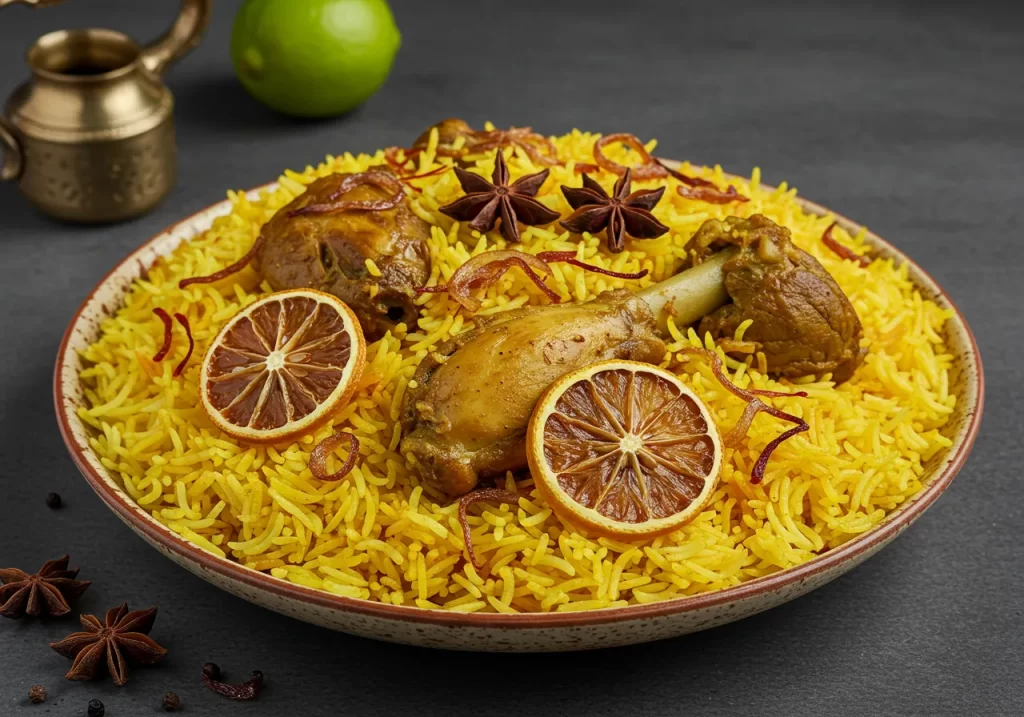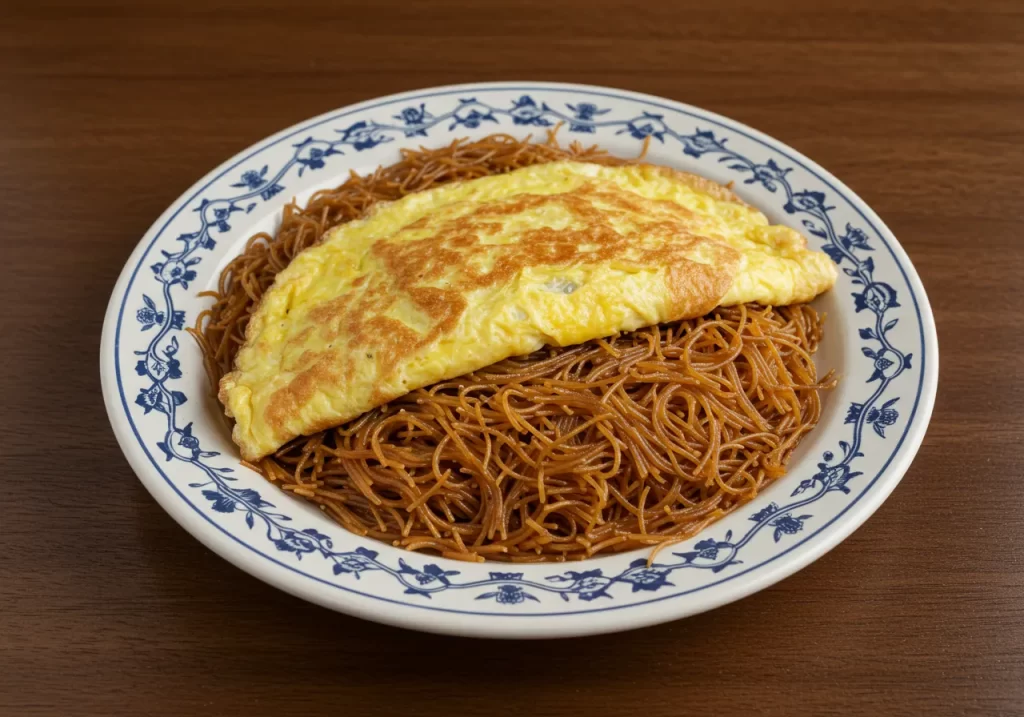
Top 8 Traditional Emirati Dishes You Must Try in Dubai 2025
Table of Contents
ToggleTraditional Emirati Dishes
Dubai offers an unforgettable food experience with its traditional Emirati dishes. Rooted in Bedouin culture, Emirati cuisine blends unique flavors and spices that reflect the city’s rich heritage. Whether you’re a tourist, food lover, or expat, trying dishes like Al Harees and Al Machboos will give you a taste of authentic Dubai. In this post, we’ll guide you through the top Emirati dishes to try in 2025, helping you explore the local food culture and discover the best places to enjoy these traditional meals.
8 Must-Try Traditional Emirati Dishes
Emirati cuisine, deeply rooted in the traditions of the Arabian Peninsula, offers a rich tapestry of flavors that reflect the UAE’s history and cultural influences. Drawing from Bedouin, fishing, and farming traditions, these dishes provide a genuine taste of the Emirates’ heritage.
Here are some of the most cherished traditional dishes:
Al Harees Emirati Dish

Al Harees is a traditional Emirati dish made with wheat and meat, typically lamb or chicken. The ingredients are slow-cooked in a clay pot, resulting in a creamy, porridge-like texture. This dish is deeply rooted in Bedouin culture and is often prepared for special occasions such as Ramadan, weddings, and other major celebrations.
How it’s Made
Ingredients
- 2 cups of wheat (soaked overnight)
- 1 kg of chicken or lamb
- Salt to taste
- Water (enough to cover the meat and wheat)
Preparation
- First, soak the wheat overnight to soften it.
- In a large pot, add the meat and cover it with water. Bring it to a boil.
- Once the meat starts to cook, add the soaked wheat and salt.
- Let it simmer on low heat for several hours, stirring occasionally to prevent burning.
- The wheat will break down and blend with the meat, creating a thick, creamy texture.
Where to Try
You can try Al Harees at Al Fanar Restaurant in Dubai Festival City. The price ranges from AED 60 to AED 80 depending on the portion size. Another great option is Logma at Boxpark Dubai, where you can enjoy a delicious bowl of Al Harees for around AED 70.
Al Machboos Emirati Dish

Al Machboos is a fragrant rice dish made with meat (usually chicken or lamb), rice, and a blend of spices including saffron, dried lemon (loomi), and turmeric. It’s similar to biryani but uniquely features the tangy flavor of loomi, making it one of the most loved dishes in Emirati cuisine.
How it’s Made
Ingredients
- 2 cups of basmati rice
- 1 kg of chicken or lamb
- 2 onions, finely chopped
- 2 cloves of garlic, minced
- 1 tbsp of turmeric, cumin, and cinnamon
- 2 dried lemons (loomi)
- 2 cups of chicken or vegetable stock
- 1 cup of saffron-infused water
Preparation
- Heat oil in a large pot, add the chopped onions and garlic, and sauté until golden.
- Add the meat and spices (turmeric, cumin, cinnamon), and sauté for 5-7 minutes until the meat is browned.
- Pour in the stock and saffron water, bring to a boil, and then reduce to a simmer. Let it cook for 30-45 minutes.
- Add the rice and loomi, then cover and cook until the rice is fully cooked and the flavors are well-melded together.
Where to Try
For an authentic Al Machboos experience, visit Al Fanar Restaurant at Dubai Festival City for about AED 75 per serving. Another great spot is Arabian Tea House in Al Fahidi Historical Neighborhood, where a serving is priced at AED 60.
Luqaimat Sweet Dish

Luqaimat is a popular sweet Emirati dumpling, known for its crispy texture and rich sweetness from date syrup. It is typically served during Ramadan and other festive occasions, enjoyed by both children and adults.
How it’s Made
Ingredients
- 2 cups of flour
- 1 tsp of yeast
- 1 tsp of sugar
- 1/2 cup of warm water
- 1/2 tsp of saffron
- Date syrup or honey
- Sesame seeds
Preparation
- Mix flour, yeast, sugar, and warm water in a bowl. Let it rest for about 30 minutes to allow the dough to rise.
- Heat oil in a deep fryer. Roll small portions of dough into balls and deep fry them until golden brown.
- Once fried, dip them into date syrup and sprinkle with sesame seeds for extra flavor.
Where to Try
Luqaimat is commonly found at food stalls and restaurants like Logma (Boxpark Dubai) for around AED 20. You can also find them at Arabian Tea House for AED 18 per portion.
Balaleet Arabian Dish

Balaleet is a traditional Emirati dish that combines sweet vermicelli with a savory omelet on top. It’s a common breakfast dish, with flavors that balance the sweetness of the noodles with the savory richness of the egg.
How it’s Made
Ingredients
- 1 cup of vermicelli
- 2 tbsp of sugar
- 1 tsp of saffron water
- 1 egg
- 1/4 tsp of cardamom
- 1 tbsp of ghee
Preparation
- Cook the vermicelli in a pan with a bit of water and sugar until it softens.
- Add saffron water and cardamom for flavor, then cook until the vermicelli is golden.
- In a separate pan, fry an omelet using ghee and cardamom, then cut it into thin strips.
- Place the omelet on top of the vermicelli before serving.
Where to Try
Balaleet is available at breakfast time at Sheikh Mohammed Centre for Cultural Understanding in Al Fahidi Historical Neighborhood, where the price ranges between AED 40 to AED 50.
Majboos Rice Dish
Majboos is another flavorful rice dish, similar to Al Machboos, but with its own twist in terms of spice combinations and texture. It’s a popular comfort food in Emirati homes, typically enjoyed with family.
How it’s Made
Ingredients
- 2 cups of basmati rice
- 1 kg of lamb or chicken
- 2 onions, finely chopped
- 1 tbsp of cumin, cinnamon, and coriander
- 1 dried lime (loomi)
- 1 cup of chicken stock
Preparation
- Heat oil in a large pot, sauté the onions, and then add the meat.
- Add spices (cumin, cinnamon, coriander) and cook for 10 minutes.
- Add the rice, stock, and loomi, cover, and cook until the rice is tender and the meat is fully cooked.
Where to Try
Logma in Boxpark Dubai serves Majboos for around AED 70, while Al Fanar Restaurant in Dubai Festival City offers it for AED 75.
Thareed Arabic Dish
Thereed is a stew-like dish made from meat, vegetables, and layers of flatbread soaked in broth. It’s a hearty and filling dish, often enjoyed during cooler months and served for large gatherings.
How it’s Made
Ingredients
- 1 kg of lamb or chicken
- 2 onions, chopped
- 2 tomatoes, chopped
- 4 pieces of flatbread
- 2 cups of broth (beef or chicken)
Preparation
- Cook the meat in a large pot with onions and tomatoes until browned.
- Add the broth and bring it to a boil.
- Tear flatbread into pieces and layer it in the pot, soaking it with the broth.
- Let it simmer for 30 minutes, allowing the bread to absorb the flavors of the stew.
Where to Try
You can try Thereed at Al Fanar Restaurant for AED 70. Another place offering authentic Emirati food is Arabian Tea House at AED 65.
Khameer & Chebab
Khameer is a soft, slightly sweet bread that pairs wonderfully with cheese or dates. Chebab is a saffron-flavored pancake, usually enjoyed with date syrup. Both are traditional Emirati breads that reflect the simple, wholesome flavors loved by locals.
How it’s Made
Ingredients
- 2 cups of flour
- 1 tsp of yeast
- 1 tbsp of sugar
- 1/4 tsp of saffron
- Water to form dough
- Ghee for frying
Preparation
- Prepare the dough by mixing flour, yeast, sugar, and water, then let it rise for 1 hour.
- Fry Khameer in ghee until golden.
- For Chebab, make a smooth batter, cook on a griddle, and serve with syrup.
Where to Try
You can try Khameer & Chebab at Logma (AED 20) or Al Fanar Restaurant (AED 25).
Camel Meat Dubai Special Dish
Camel meat is considered a delicacy in the UAE. It has a unique, slightly gamey flavor and is often served in stews or grilled. Camel meat is lean and rich in protein, and it holds great cultural significance in Emirati cuisine.
How it’s Made
Ingredients
- 1 kg of camel meat
- Spices like cumin, coriander, cinnamon, and cardamom
- 2 onions, chopped
- 4 tomatoes, chopped
- 1 cup of broth
Preparation
- Brown the camel meat with onions, tomatoes, and spices.
- Add the broth and simmer for a couple of hours until the meat becomes tender.
- Serve hot with rice or flatbread.
Where to Try
Al Fanar Restaurant offers Camel Meat dishes starting at AED 150. You can also find it at local heritage restaurants for a similar price range.
Cultural Tips While Dining in Dubai
When enjoying a meal in Dubai, it’s important to be mindful of local customs and traditions that shape the dining experience.
Here are a few cultural tips to make sure you’re respectful and immersed in the authentic Emirati way of dining:
1. Eating with Your Hands (The Traditional Way)
In Emirati culture, eating with your hands is a sign of respect and connection to the food. Traditionally, meals are shared among family and friends, and eating with your right hand is encouraged. The left hand is considered less clean in many Middle Eastern cultures, so it’s best to avoid using it for eating. It is a gesture of respect to the meal, as well as to the person who has prepared it.
Many traditional dishes, especially rice-based meals like Al Machboos or Al Harees, are often eaten with the hands. This practice helps connect diners with the food in a more intimate and authentic way, allowing them to appreciate its texture and flavors.
Tip: If you’re dining with locals, try using flatbread to scoop up rice and meat, and remember to use your right hand only.
2. Respecting Local Customs (Modesty, Prayer Times, and More)
Emirati culture is deeply rooted in Islamic values, which influences daily activities, including dining. There are a few things to keep in mind:
- Modesty: In social settings, modesty is highly valued. While dining, it’s important to dress conservatively. Even though Dubai is more liberal than some other regions in the UAE, it’s still best to dress modestly in public spaces and restaurants.
- Prayer Times: Muslims pray five times a day, and prayer times are an essential part of life in Dubai. If you’re dining during prayer time, the restaurant may temporarily stop service for the prayer. It’s a good idea to be patient and respectful of this tradition. Many restaurants in Dubai follow prayer times strictly, and you may notice a brief pause in service.
- Waiting for the Elders: When dining with an Emirati family, it’s customary to wait for the eldest person to begin eating before you start. This is a sign of respect and politeness. Always wait for the host to offer the first serving of food.
Tip: If you’re in a local restaurant, be mindful of prayer times, as some places may close briefly for prayers. This pause is an important part of respecting the religious practices of the locals.
3. Offering and Receiving Food with Respect
In Emirati culture, hospitality is taken very seriously, and food plays a significant role in it. If you’re invited to someone’s home, it’s common for the host to serve food, and it’s customary to accept it graciously. If offered a second helping, it’s polite to accept, but you can always say “no thank you” if you’re full.
When receiving food or drinks, always use your right hand, as it’s considered polite and respectful. If you’re presented with a beverage like Arabic coffee (Gahwa), it’s traditional to drink in small sips and hand the cup back to the host, signaling that you’re satisfied. If you need more, a small tilt of the cup will indicate your desire for a refill.
Tip: If you’re offered food in someone’s home, try not to refuse unless there’s a valid reason. It’s seen as a sign of respect and honor to accept food offerings in this culture.
Conclusion
Exploring the traditional Emirati dishes in Dubai offers a unique glimpse into the rich culture and history of the UAE. From the slow-cooked Al Harees to the sweet delights of Luqaimat, each dish carries with it centuries of tradition, craftsmanship, and hospitality. Understanding the cultural dining practices, such as eating with your hands and respecting local customs, enhances your experience, making it more than just a meal – it becomes a cultural journey. For food lovers, tourists, and culture seekers looking to enjoy the best of Dubai’s local cuisine, Tripscape is your go-to partner for curated, authentic culinary tours and experiences. Book your next gastronomic adventure with Tripscape and dive deep into the heart of Dubai’s culinary delights, ensuring an unforgettable and culturally rich experience.
Recent Posts
10 Dubai Sand Dunes Outfit Ideas
10 Birthday Celebration Ideas in Dubai
5 Best Breakfast in Dubai with View
All Categories
Tags

Desert Safari Dubai




